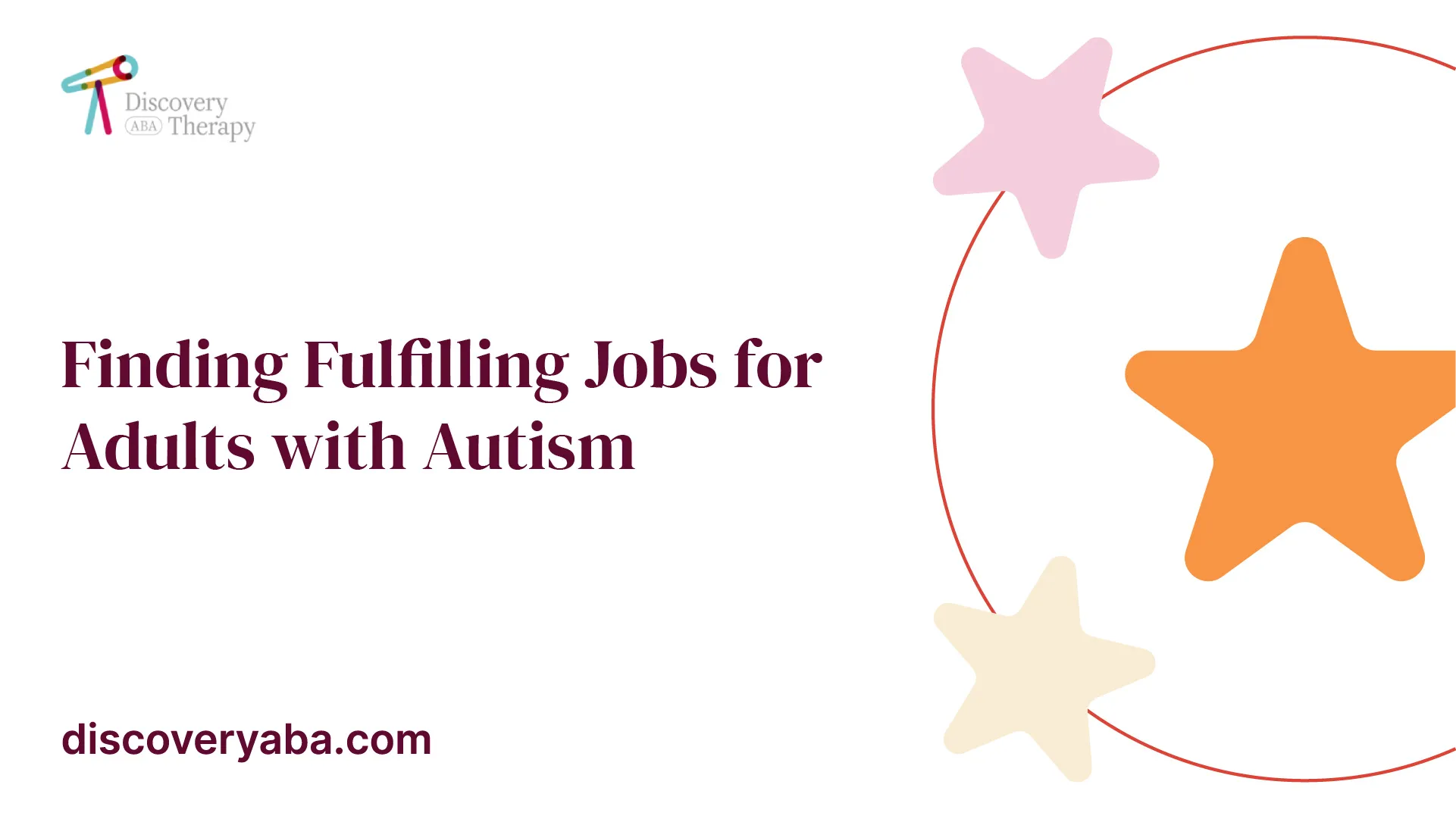Finding Fulfilling Jobs for Adults with Autism
Discover fulfilling jobs for adults with autism. From inclusive companies to vocational training, explore pathways to success!

The Importance of Employment for Adults with Autism
For adults with autism, finding fulfilling employment is not only essential for financial independence but also for overall well-being. Unfortunately, the unemployment rate for individuals on the autism spectrum remains alarmingly high. Approximately 80 percent of adults with autism are unemployed, despite their willingness and ability to work.
Understanding the Unemployment Rate
The high rate of unemployment among adults with autism is a significant concern. Research suggests that nearly 85% of college graduates with autism are unemployed, highlighting the need for more inclusive work environments and job opportunities for individuals on the autism spectrum.

Recognizing the Unique Skills of Individuals with Autism
Despite the challenges faced by individuals with autism in areas like communication and social interactions, they possess unique skills that can make them valuable assets in the workforce. Many adults with autism excel in roles that require attention to detail, pattern recognition, technical capabilities, and specialized expertise. Their ability to focus, their precision, and their dedication to routine can contribute to their success in various industries, such as technology, data analysis, and cybersecurity.
Recognizing these strengths and abilities is crucial in creating job opportunities that align with the unique talents of individuals with autism. Employers are beginning to recognize the value that individuals with autism bring to the workforce. Companies like Microsoft, SAP, and Ford have actively started hiring individuals with autism, fostering inclusive work environments that celebrate neurodiversity.
By providing employment opportunities that capitalize on the strengths of individuals with autism, we can create a more inclusive society and help individuals with autism thrive both personally and professionally.
Companies Hiring Adults with Autism
In order to address the high unemployment rates among adults with autism, it is essential for companies to provide better opportunities and create inclusive work environments. Several companies have recognized the value that individuals with autism bring to the workforce and have actively started hiring them.
Examples of Inclusive Employers
Prominent companies such as Microsoft, SAP, and Ford have taken a proactive approach to hiring individuals with autism. These companies have recognized the unique skills possessed by individuals with autism, such as attention to detail, pattern recognition, and technical capabilities. By actively hiring individuals with autism, these inclusive employers have created diverse and supportive work environments that benefit both the individuals and the companies themselves.
Industries that Value Autism Skills
The skills possessed by individuals with autism make them valuable assets in various industries. Some industries that particularly value the skills of individuals with autism include technology, data analysis, and cybersecurity. The attention to detail, analytical abilities, and precision-oriented mindset of individuals with autism are highly sought after in these fields.
By harnessing the unique strengths and capabilities of individuals with autism, these inclusive employers and industries are not only providing fulfilling job opportunities but also benefiting from the diverse perspectives and talents that individuals with autism bring to the workforce.
Creating a more inclusive work environment and increasing job opportunities for individuals with autism is crucial to address the high unemployment rates and unlock the potential of this talented demographic. Initiatives like Autism at Work have been implemented by companies to foster inclusive workplaces and provide support for hiring individuals with autism. These initiatives aim to create a more diverse and supportive work environment, benefiting both the employees and the companies.
By increasing awareness about the valuable skills and abilities of individuals with autism, more companies across different industries can embrace inclusive hiring practices and provide meaningful employment opportunities. This not only enhances the lives of individuals with autism but also contributes positively to the performance and success of these companies.
Creating Inclusive Work Environments
To promote the employment of adults with autism, it is crucial to create inclusive work environments that accommodate their unique needs and support their success. By implementing job accommodations and providing training and support for employers, companies can create an inclusive workplace that allows individuals with autism to thrive.
Job Accommodations for Success
Many adults with autism face barriers to employment due to factors like communication challenges, sensory sensitivities, and social difficulties. Job accommodations play a vital role in helping individuals with autism succeed in the workforce. These accommodations can include:
- Flexible work hours: Offering flexible schedules can help individuals with autism manage their energy levels and accommodate any sensory or cognitive differences they may experience.
- Job coaching: Providing job coaches who offer personalized support can help individuals with autism navigate their job responsibilities and overcome any challenges they may face.
- Sensory-friendly work environments: Creating a sensory-friendly workplace with appropriate lighting, reduced noise levels, and comfortable workspaces can help minimize sensory overload for individuals with autism.
By implementing these accommodations, employers can create an environment that supports the unique needs of individuals with autism, enabling them to perform their best and contribute to the company's success.
Training and Support for Employers
Supporting employers through training and education is essential for fostering an inclusive work environment for individuals with autism. Providing training to employers, co-workers, and supervisors on how to support individuals with autism in the workplace can lead to increased job retention rates and improved job satisfaction among employees with autism. Some key aspects of training and support include:
- Autism awareness: Educating employers and colleagues about autism spectrum disorder (ASD) can help create a better understanding of the challenges and strengths associated with the condition. This awareness can foster empathy and promote a supportive workplace culture.
- Communication strategies: Providing guidance on effective communication strategies can help employers and colleagues engage and collaborate effectively with individuals with autism. This may include clear and concise instructions, visual aids, or assistive communication tools.
- Sensitivity training: Offering sensitivity training sessions can help colleagues and supervisors develop a deeper understanding of sensory sensitivities and social communication differences that individuals with autism may experience. This training can encourage a more inclusive and supportive work environment.
By equipping employers with the necessary knowledge and tools to support individuals with autism, companies can create an inclusive work environment where individuals with autism can thrive and contribute their unique talents and abilities.
In conclusion, creating inclusive work environments for adults with autism involves implementing job accommodations that address their specific needs and providing training and support for employers. By taking these steps, companies can foster an environment that embraces the diverse talents of individuals with autism and promotes their success in the workplace.
Vocational Training Programs for Adults with Autism
Vocational training programs play a crucial role in equipping adults with autism with the necessary skills and support to secure meaningful employment. These programs focus on tailored instruction, individualized goals, and the development of vocational and life skills.
Tailored Programs and Individualized Goals
Vocational training programs, such as the one offered at the Adult Autism Center, understand the importance of tailoring their programs to meet the unique abilities and interests of each client. They offer a range of areas of interest, including mechanics, skilled crafts, business, food service, healthcare, and computer-related jobs. This customization ensures that individuals with autism receive the training that aligns with their strengths and preferences.
These programs establish individualized goals for each participant, taking into account their specific needs and aspirations. The goals may include learning job-specific skills, improving communication abilities, and developing social relationships with co-workers. By setting personalized goals, vocational training programs empower individuals with autism to work towards their full potential and achieve increased independence.
To guide the training process, vocational training programs often employ a structured curriculum. The Adult Autism Center, for example, utilizes a web-based curriculum to teach vocational skills and assess the progress of clients. This approach allows for systematic instruction and the identification of the most appropriate programs for each individual.
Teaching Vocational and Life Skills
Vocational training programs for adults with autism not only focus on job-specific skills but also emphasize the development of essential life skills. These programs aim to equip individuals with the tools they need to navigate the workplace successfully and foster independence.
The curriculum within vocational training programs covers a range of areas, including applying for jobs, interviewing techniques, communication skills, conflict resolution, and responding to feedback. By addressing these areas, individuals with autism gain valuable skills that support self-advocacy and enhance their ability to interact effectively with co-workers and supervisors.
Moreover, vocational training programs recognize the importance of teaching general life skills alongside vocational skills. These skills may include time management, personal hygiene, transportation, and money management. By providing comprehensive training, these programs prepare adults with autism for the challenges and responsibilities of the workplace, as well as daily life.
The ultimate aim of vocational training programs is to support individuals with autism in reaching their full potential and achieving employment outcomes that align with their goals. Some individuals may aspire to self-employment, while others may seek supported employment opportunities. The progress of participants is regularly monitored and measured based on increased independence in task completion and the achievement of personal goals. Through these programs, adults with autism gain the skills, confidence, and support they need to pursue fulfilling and meaningful careers.
Increasing Awareness and Opportunities
Creating a more inclusive society involves increasing awareness and providing opportunities for individuals with autism to thrive in the workplace. By implementing initiatives for workplace inclusion and recognizing the benefits of hiring individuals with autism, we can promote a more diverse and supportive work environment.
Initiatives for Workplace Inclusion
Several initiatives have been established to foster workplace inclusion for individuals with autism. One notable example is Autism at Work, a program implemented by companies to provide support and resources for hiring individuals with autism. This initiative aims to create an inclusive work environment that values the unique skills and contributions of individuals with autism.
By actively promoting workplace inclusion, companies can tap into the talents and abilities of individuals with autism, creating a diverse workforce that benefits both the individuals and the organization. Employers such as Microsoft, SAP, and Ford have recognized the value that individuals with autism bring to the workforce and have made efforts to actively hire them.
Benefits of Hiring Individuals with Autism
Hiring individuals with autism can bring numerous benefits to employers and the workplace as a whole. Many adults with autism possess unique skills that make them valuable assets in various industries. These skills can include attention to detail, pattern recognition, technical capabilities, and strong problem-solving abilities [2].
Employers who embrace diversity and hire individuals with autism can tap into these unique skill sets, leading to increased productivity and innovation. Attention to detail, for example, can contribute to enhanced accuracy and quality in tasks. The ability to recognize patterns can be valuable in fields such as data analysis, while technical capabilities can be an asset in technology-related roles. Moreover, individuals with autism often exhibit a strong work ethic and dedication to their tasks.
By providing training and support for employers, co-workers, and supervisors on how to effectively support individuals with autism in the workplace, organizations can create an environment that promotes job retention and job satisfaction among employees with autism. This leads to a more inclusive and supportive work culture, benefitting both the employees and the organization as a whole.
By implementing initiatives for workplace inclusion and recognizing the benefits of hiring individuals with autism, we can open up more opportunities and create a more inclusive work environment for all. Embracing the diverse talents and unique perspectives that individuals with autism bring to the workplace can lead to a more innovative, productive, and fulfilling work experience for everyone involved.
References
- https://workology.com/companies-hiring-adults-with-autism/
- https://www.helpguide.org/articles/autism-learning-disabilities/autism-at-work.htm
- https://www.forbes.com/sites/jenniferpalumbo/2022/06/29/how-autistic-individuals-can-offer-special-skills-to-your-business/
- https://www.forbes.com/sites/forbesbusinesscouncil/2021/05/10/autism-awareness-six-steps-for-greater-inclusion-in-the-workplace/
- https://adultautismcenter.org/programs/vocational-training-for-adults-with-autism/
Does Your Child Have An Autism Diagnosis?
Learn More About How ABA Therapy Can Help
Find More Articles
Contact us
North Carolina, Nevada, Utah, Virginia
New Hampshire, Maine
Arizona, Colorado, Georgia, New Mexico, Oklahoma, Texas
.avif)




































































































